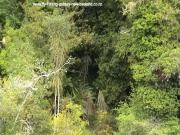Lancewood
Jump to navigation
Jump to search
Description
A durable and elastic wood obtained from several tropical American trees, especially, Oxandra lanceolata, Guatteria virgata and Calycophyllum candidissimum. The hard wood has an smooth close grain. Its elasticity has made it useful for making bows, fishing rods, billiard cues, and tool handles. Lancewood is also used for carriage shafts, wheel spokes, and cabinetry.
Synonyms and Related Terms
Oxandra lanceolata; Guatteria virgata; Calycophyllum candidissimum; yaya; degami wood
Physical and Chemical Properties
- Color = Sapwood is pale yellow (normally harvested); heartwood is darker golden yellow
- Grain = straight with very fine, even texture and natural luster
- Durability = High resistance to abrasin and wear, but poor resistant to weathering and insects.
- Density = 5265 ppcf
Working Properties
- Good results to most machining operations; high cutting resistance will slow work.
- Moderate blunting effect on cutting edges.
- Turns superbly.
Resources and Citations
- The Wood Database: [httpancewood]s://www.wood-database.com/lancewood/
- G.S.Brady, Materials Handbook, McGraw-Hill Book Co., New York, 1971 Comment: p. 436
- Ralph Mayer, A Dictionary of Art Terms and Techniques, Harper and Row Publishers, New York, 1969 (also 1945 printing)
- F. H. Titmuss, Commercial Timbers of the World, The Technical Press Ltd., London, 1965
- Random House, Webster's Encyclopedic Unabridged Dictionary of the English Language, Grammercy Book, New York, 1997
- The American Heritage Dictionary or Encarta, via Microsoft Bookshelf 98, Microsoft Corp., 1998
